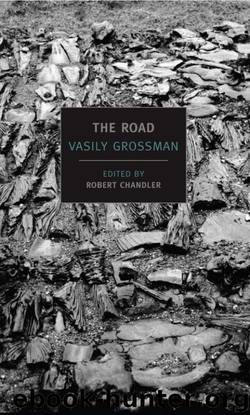The Road: Stories, Journalism, and Essays (New York Review Books Classics) by Vasily Grossman (2010-09-28) by Vasily Grossman;

Author:Vasily Grossman; [Grossman;, Vasily]
Language: swe
Format: epub
Amazon: B017V8DPA0
Publisher: NYRB Classics
Published: 1800-03-15T00:00:00+00:00
The Elk*
As she was leaving for work, Aleksandra Andreyevna would spread a napkin on a chair. On it she would put a glass of milk, along with a white rusk on a saucer. Then she would kiss Dmitry Petrovich on his warm, hollow temple.
On her way back in the evening, she would imagine how lonely the sick man must be feeling. On seeing her, he would prop himself up on one elbow, and his empty eyes would come to life.
One evening he said, “You must see so many people at work and in the metro, while all I ever see is this moth-eaten head.” And he pointed a pale finger at a brown elk head hanging on the wall.
Aleksandra Andreyevna’s colleagues felt sorry for her. They knew that her husband was seriously ill and that he needed a lot of care, even during the night.
“You, Aleksandra Andreyevna,” they would say, “are a true martyr.”
“What do you mean? It’s really not difficult at all. Far from it.”
But a twenty-hour day, at home and at her workplace, was too great a burden for an aging woman who was in poor health herself. After night after night of too little sleep, she was suffering not only from headaches but also from high blood pressure.
Aleksandra Andreyevna said nothing about her poor health to her husband. Sometimes, though, she would come to a sudden standstill as she was walking about the room. As if trying to remember something, she would put her hand over her eyes and the lower part of her forehead.
“You need a rest, Shura,” he would say. “Be kind to yourself.”
But words like this upset her, and even angered her.
She was on the staff of the archives of the Central Library. When she got to work, she would forget about the difficulties of the night. Fair-haired Zoya, who had been sent there immediately after graduating from her institute, would say, “Sit down now. Take the weight off your poor swollen legs!”
“They’re not so bad,” Aleksandra Andreyevna would answer with a smile.
Back at home she would tell her husband about the manuscripts and documents she was analyzing at work. She loved the 1870s and 1880s. To her there was something deeply precious about every least trifle to do with the Populists of that era—every least trifle concerning not only the more famous figures such as Osinsky, Kovalsky, Khalturin, Zhelvakov, Zhelyabov, Perovskaya, and Kibal'chich but also dozens of other forgotten revolutionaries in the inner circles or on the outer fringes of the various revolutionary organizations of the time: the Chaikovtsy, the Ishutin circle, the Black Repartition, and The People’s Will.
Dmitry Petrovich did not share his wife’s enthusiasm, which he put down to her coming from a revolutionary family. Her family photograph album was full of pictures of long-haired students with rugs thrown over their shoulders, of young women with short hair and severe faces, in dresses with narrow waists, long sleeves, and high black collars. Aleksandra Andreyevna remembered all their names. She—and she alone—remembered
Download
This site does not store any files on its server. We only index and link to content provided by other sites. Please contact the content providers to delete copyright contents if any and email us, we'll remove relevant links or contents immediately.
| African | Asian |
| Australia & Oceania | Canadian |
| Caribbean & Latin American | European |
| Jewish | Middle Eastern |
| Russian |
The Hating Game by Sally Thorne(17556)
The Universe of Us by Lang Leav(14402)
Sad Girls by Lang Leav(13380)
The Lover by Duras Marguerite(7153)
Smoke & Mirrors by Michael Faudet(5537)
The Rosie Project by Graeme Simsion(5221)
The Shadow Of The Wind by Carlos Ruiz Zafón(4965)
Big Little Lies by Liane Moriarty(4909)
The Poppy War by R. F. Kuang(4507)
Memories by Lang Leav(4186)
What Alice Forgot by Liane Moriarty(3938)
An Echo of Things to Come by James Islington(3882)
From Sand and Ash by Amy Harmon(3709)
The Poetry of Pablo Neruda by Pablo Neruda(3389)
The Tattooist of Auschwitz by Heather Morris(3280)
Guild Hunters Novels 1-4 by Nalini Singh(2950)
Ficciones by Jorge Luis Borges(2885)
THE ONE YOU CANNOT HAVE by Shenoy Preeti(2838)
The Rosie Effect by Graeme Simsion(2734)
